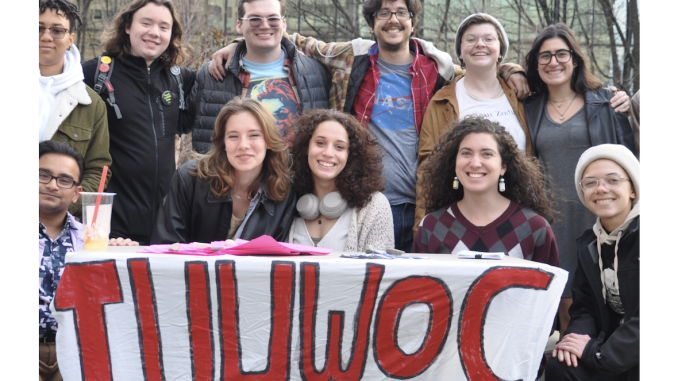
For six weeks, the Temple University Undergraduate Workers Organizing Committee collaborated with the Temple University Graduate Students’ Association to raise undergraduate awareness of its 42-day strike, which ended on March 13. In doing so, they also realized the level of solidarity among workers at Temple.
“It shows us that we are not alone, that oftentimes the problems that affect us in our workplace are not just us,” said Josh Palackal, a junior psychology major and member of TUUWOC.
TUUWOC formed in September 2022 and is seeking recognition as a union to bargain for an improved contract for Temple’s undergraduate workers. The organization, which currently represents nearly 125 student workers, hopes to achieve an increase to a $15 minimum wage for all student workers and improved benefits, including overtime pay. TUUWOC members were able to spread their message during TUGSA’s recent strike by speaking at rallies and making signs for the protests.
“We were able to increase our social media following by over 300 percent in about two or so weeks,” Palackal said. “From there, we got a bunch of union cards signed, compared to this semester we’ve gotten, I want to say, around 350 percent more signatures than we got last semester.”
TUUWOC must have at least 30 percent of Temple’s approximately 3,900 student workers sign a union card in order to be formally recognized as a union. The committee would then petition to Pennsylvania’s Labor Relations Board for approval.
Alternatively, 30 percent of workers within a department could sign a union card and the organization could unionize by department, Palackal said.
Unionization would help students like Halle Howard, a junior history major and member of TUUWOC, feel represented.
“We don’t have any form of representation in terms of a union, and that doesn’t bode well for our working conditions,” Howard said.
To achieve the goal of unionizing, TUUWOC members are focusing on getting their message out by posting fliers around campus and hosting information sessions.
“A lot of it just comes down to communication, letting people know that unionizing is legal and possible,” Howard said.
Once unionized, TUUWOC has a five-point union platform bargaining for health insurance subsidies, a simpler health insurance application process. The plan also advocates for transparent hiring, payment and wages processes in addition to the $15 hourly minimum wage and overtime pay.
TUUWOC’s was formed after Ignacio Vasconsellos, an organizer in the committee, saw an increase of undergraduate student unions across the country.
“The fact that undergraduate workers are uniting across the country, it made it seem possible and made it seem like we could do it,” said Vasconsellos, a senior history and Latin American studies double major.
In 2021, the National Labor Relations Board withdrew a rule proposed in September 2019 by the Trump administration that stipulated students working for their university could not be considered employees.
These reforms have allowed for an increase in union formation in recent years, especially in the academic sector. Labor unions have been created on the campuses of many universities, like the Massachusetts Institute of Technology’s Graduate Student Union, which formed in April 2022.
Undergraduate unions have also caught on, with undergraduate students at institutions such as Dartmouth College and Grinnell College planning to unionize, NPR reported.
Philadelphia has a rich history of unions. The first recorded strike and union both occurred in the city, which Vasconsellos feels has aided TUUWOC’s cause.
“It does help that Philly is a union town, that there’s a long history of union organizing in Pennsylvania in general and that people are more willing to stick their neck out when they know that they are a part of history, that they are part of a place’s culture,” Vasconsellos said.
It was necessary for students like Palackal to join TUUWOC because of the low wages and limited benefits Temple offers its student workers.
“Some of us make as little as $7.25 an hour which is the minimum wage in Pennsylvania, which is frankly just unethical,” Palackal said.
Vasconsellos hopes that TUUWOC’s efforts create long-lasting change at Temple.
“I would like to see the university become a better place for undergraduate students in general, but for workers also specifically so that they can get the health care that they need, so that they can get decent wages and a dignified workplace and so that they aren’t paid basically in exposure with a line on their resume that says that they had worked for Temple University,” Vasconsellos said.


Be the first to comment